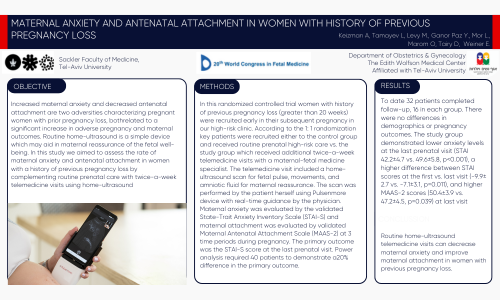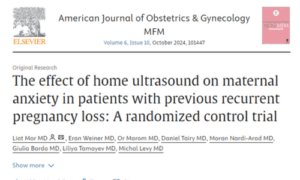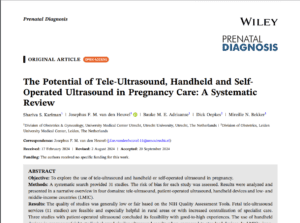Authors:
Keizman A, Tamayev L, Levy M., Ganor Paz Y., Mor L., Marom O, Tairy D, Weiner E.
Objective:
Increased maternal anxiety and decreased antenatal attachment are two adversities characterizing pregnant women with prior pregnancy loss, bothrelated to a significant increase in adverse pregnancy and maternal outcomes. Routine home-ultrasound is a simple device which may aid in maternal reassurance of the fetal wellbeing. In this study we aimed to assess the rate of maternal anxiety and antenatal attachment in women with a history of previous pregnancy loss by
complementing routine prenatal care with twice-a-week telemedicine visits using home-ultrasound.
Methods:
In this randomized controlled trial women with history of previous pregnancy loss (greater than 20 weeks) were recruited early in their subsequent pregnancy in
our high-risk clinic. According to the 1: 1 randomization key patients were recruited either to the control group and received routine prenatal high-risk care vs. the study group which received additional twice-a-week telemedicine visits with a maternal-fetal medicine specialist. The telemedicine visit included a homeultrasound scan for fetal pulse, movements, and amniotic fluid for maternal reassurance. The scan was performed by the patient herself using Pulsenmore
device with real-time guidance by the physician.
Maternal anxiety was evaluated by the validated State-Trait Anxiety Inventory Scale (STAI-S) and maternal attachment was evaluated by validated Maternal Antenatal Attachment Scale (MAAS-2) at 3 time periods during pregnancy. The primary outcome was the STAI-S score at the last prenatal visit. Power analysis required 40 patients to demonstrate a 20% difference in the primary outcome.
Results:
To date 32 patients completed follow-up, 16 in each group. There were no differences in demographics or pregnancy outcomes. The study group demonstrated lower anxiety levels at the last prenatal visit (STAI 42.2±4.7 vs. 49.6±5.8, p<0.001), a higher difference between STAI scores at the first vs. last visit (-9.9±2.7 vs. -7.1±3.1, p=0.011), and higher MAAS-2 scores (50.4±3.9 vs. 47.2±4.5, p=0.039) at last visit
Conclusion:
Routine home-ultrasound telemedicine visits can decrease maternal anxiety and improve maternal attachment in women with previous pregnancy loss.







